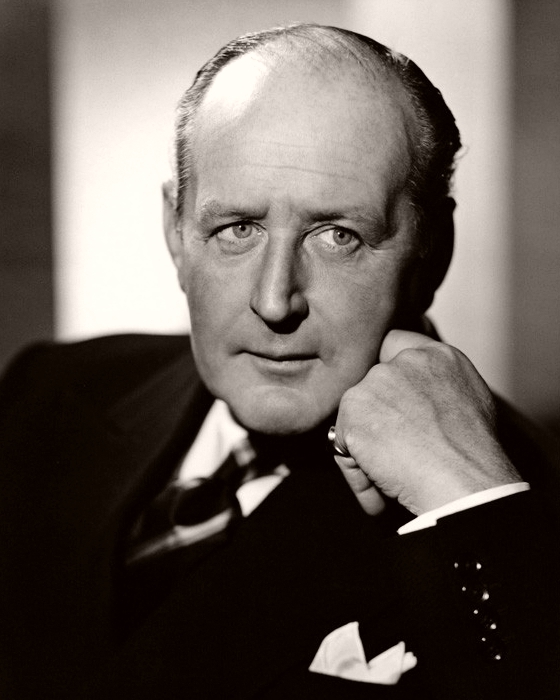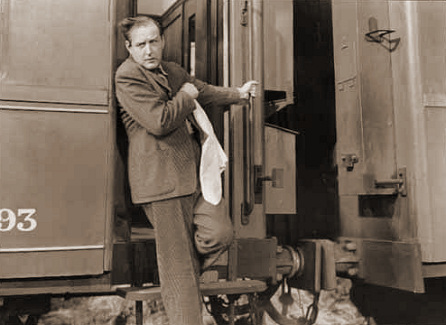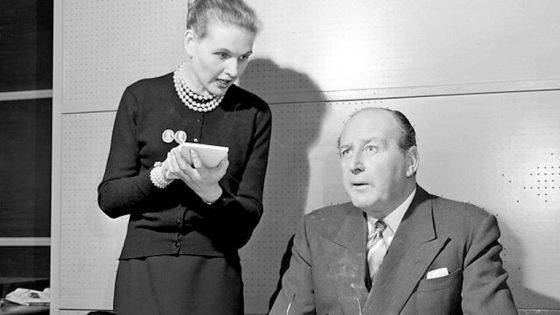
He was in so many films before and after the War and into the 70 s and he is instantly recognisable.
Another of my memories of him – in fact one I have only recently discovered – is the Radio Drama Series that he starred in as ‘Dr. Morelle’ which ran for 13 episodes in the late 1950’s – I wish they had made many more as I just love them and listen to them over and over again. This also starred Sheila Sim as Miss Frayle his sidekick
The Parker Family History
Tim Parker has written a book about the extraordinary life history of Cecil Parker and his family. Tim, now 84, lives in Brighton, only found out his real family name was Schwabe at the age of 43. “I was driving through London listening to Radio 3 when there was an announcement of Cecil Parker’s death,” he recalled. “It was an appreciation of him as an actor and mentioned that his real surname was Schwabe. I thought they had got it wrong but my mother told me it was true. I asked why she hadn’t told me and she said because it had all been so difficult.”
“I like to think it’s an extraordinary story,” he said. “I feel the honour of what my two uncles did. Not only did the first generation fight through the First World War but the second generation then fought in the Second World War. Yet people threw bricks through their hotel windows because of anti-German feeling during the First World War.”
The change of name became a family secret for decades but now the full remarkable story has been told in a new book, A Question Of Identity, by historian Tim Parker, the nephew of actor Cecil Parker.
The Parker family saga began when Charles August Schwabe was born near Frankfurt in 1860, the illegitimate son of Dorothea and a man described as “a hunter”. He arrived in England in 1890 and fell in love with church organist Kate Parker. She was 19 and he was 30, and after they married, they settled in Hastings to run The Albany hotel. They had 11 children, including sons Charles, the oldest, Sydney, Cecil and Tim’s father Eric.
In 1908 August was “proud” to become a British citizen but when war was declared in 1914, he was visited by Hastings police. They declared him a loyal subject but he suffered “shock and humiliation” by their visit.
His sons Charles, Sydney and Cecil signed up, Charles joining the Royal Fusiliers and the others joining the Royal Sussex Regiment, a battalion of local men raised for the army by Colonel Claude Lowther, the owner of Herstmonceux Castle. Sydney and Cecil spent 18 months training there.
“Cecil… was a shy and rather diffident soldier,” writes Mr Parker. “He did not like Army life but did his best and his great sense of humour carried him through, together with the joy of having his older brother Sydney with him.”
In 1915, August died of stomach cancer, leaving 45-year-old Kate alone, her youngest child just five, and now in charge of The Albany. She sold it and took over management of The Alexandra hotel in St Leonards, telling the children they had to change their surname to her maiden name and that “none of them were to talk about it”.
In 1916, Charles, now a captain with the Royal Fusiliers, was deployed on the Western Front, where he was injured and gassed before he simply disappeared for two and a half years.
The family later discovered he had been recruited by MI6 as a Secret Service intelligence officer and sent to revolutionary Russia.
Charles, a chemist, worked on ways gas could be used to defend Russia but also enjoyed partying in St Petersburg where author Arthur Ransome, a left-wing socialist, was among his friends.
A year after the Russian Revolution of 1917, militant Bolsheviks, the leaders of the country’s revolutionary working class, attacked the British Embassy in Petrograd and its staff, including Captain Schwabe, were incarcerated in medieval dungeons in the decaying Peter and Paul Fortress on an island on the Neva River. In just three weeks, 500 political prisoners were executed but Captain Schwabe escaped, jumping into the freezing Neva and swimming to the river bank before making his way to the American Embassy. Two days later, he left the embassy by night and made his way to Finland by swimming the frontier stream between the two countries. He was reunited with his colleagues and in 1919 returned to Britain, where he received the OBE.
Meanwhile, in 1916 Sydney and Cecil sailed for France with three Royal Sussex Battalions and fought in the infamous Battle of Boar’s Head.
Sydney was badly injured and sent home. After he recovered, he returned to France in 1918 and was killed, aged 23.
Cecil was also injured and when he had recovered was given the job of dispatch rider. He had never ridden a motorcycle before and crashed during his first lesson, dislocating his neck.
He was sent back to Britain to be nursed back to health by his mother, who gave him a plot of land where he raised chickens. He had refused to change his name from Schwabe “to make quite sure the Army pays my dues”. Now, in 1919, aged 21, he became a song and dance man with an amateur dramatic group in Hastings. He made his professional debut at the Devonshire Park Theatre in Eastbourne in 1922 and his West End debut three years later, falling in love with his leading lady, Muriel Brown. They were married in 1927, their daughter, Angela, born the following year.
Cecil Parker’s career took off and he became one of the great character actors of cinema’s golden age, with an ability to appear menacing, authoritative or stuffy. He appeared in 91 films between 1933 and his last film, Richard Attenborough’s Oh, What A Lovely War!, which was filmed in Brighton in 1969. He made his first real mark in films as nervous would-be adulterer Mr Todhunter in Alfred Hitchcock’s 1938 thriller The Lady Vanishes, starring alongside Margaret Lockwood and Michael Redgrave, and he went on to appear in Carol Reed’s 1939 film The Stars Look Down.

Perhaps his biggest films were Caesar and Cleopatra, the 1945 Hollywood adaptation of George Bernard Shaw’s play, where he played Britannus opposite Claude Rains as Caesar, Vivien Leigh as Cleopatra and Douglas Fairbanks as Antony, and the 1958 romantic comedy Indiscreet with Ingrid Bergman and Cary Grant.
He also had fun in the 1955 British classic comedy The Ladykillers and as a professor in The Pure Hell of St Trinian’s in 1960.

“My memories are of a gentle, courteous man, a little shy, but with a great sense of humour,” said Tim. “He was fun to be with and everybody who knew him liked him.”
Cecil and Muriel retired to Brighton after he shot his last movie and for the last two years of his life was in and out of the Royal Sussex County Hospital with bronchitis and a heart problem. He died in 1972.
Tim said: “It has taken me some 60 odd years to find out who the Schwabes are. This is the story of what I’ve discovered.”
Place your comment